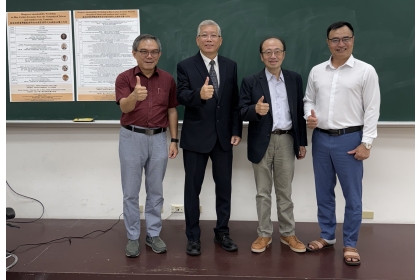NCHU Sustainable Marketing Lab Hosts “Mangrove Sustainability Workshop on Blue Carbon Economy from the Viewpoint of Taiwan and Southern Asia Countries,” Bringing Together Global Expertise for Mangrove Sustainability
2025-06-06
興新聞張貼者
Unit秘書室
1,148
Source: Department of Marketing, National Chung Hsing University
On June 4, Professor Lee, Tzong-Ru from the Sustainable Marketing Lab of the Department of Marketing at National Chung Hsing University (NCHU) hosted the Mangrove Sustainability Workshop on Blue Carbon Economy from the Viewpoint of Taiwan and Southern Asia Countries. The event gathered 50 experts, scholars, and students from both Taiwan and abroad, participating onsite and online to explore the future of the blue carbon economy.
Several internationally renowned scholars were invited for in-depth exchanges. Dr. Lin, Hsing-Juh, Distinguished Professor of the Department of Life Sciences at NCHU, elaborated on the critical importance of blue carbon for Taiwan. He underscored the close linkage between his research and national key policies, highlighting blue carbon’s central role in Taiwan's sustainable development.
Dr. Lee Chee Wee, Principal Scientist at Temasek Polytechnic in Singapore, focused on balancing environmental protection, community empowerment, and food security. He introduced Integrated Mangrove Aquaculture (IMA), an innovative approach that integrates sustainable seafood farming within mangrove ecosystems, aiming to create a future where food security, environmental health, and community prosperity coexist.
Dr. Hai Hoa Nguyen, Associate Professor in Geography and Environmental Management, Department of Environmental Engineering at Vietnam National University of Forestry, emphasized that combining remote sensing technology with on-site data enables reliable and precise estimation of mangrove carbon sinks, providing a solid scientific foundation for developing the blue carbon trading market.
Executive Dr. Ravinder Khetarpal, Executive Director of the Asia-Pacific Association of Agricultural Research Institutions (APAARI), highlighted the Asia-Pacific region as the global center of mangrove ecosystems, serving as a powerful carbon sink and making outstanding contributions to carbon sequestration. He proposed directions for conservation and restoration, relevant policy recommendations, strategies for scaling up blue carbon initiatives, and potential areas for future research.
In addition, six representatives from National Sun Yat-sen University, National Taitung University, National Taiwan University, National Pingtung University of Science and Technology, and National Chung Hsing University shared preliminary research findings from Taiwan’s scientific community on mangroves and carbon sinks, demonstrating Taiwan’s active involvement in the field.
Professor Lee, Tzong-Ru remarked that the workshop successfully brought together leading domestic and international scholars for academic exchange, significantly enhancing Taiwan’s international influence in mangrove ecology and carbon sink technologies. Through close academic interactions and on-site investigations, the workshop also effectively fostered collaboration between Taiwan and Southern Asia countries in the blue carbon economy. Looking ahead, NCHU anticipates more frequent and deeper interactions and cooperation with mangrove scholars worldwide to contribute to global climate change mitigation efforts.
On June 4, Professor Lee, Tzong-Ru from the Sustainable Marketing Lab of the Department of Marketing at National Chung Hsing University (NCHU) hosted the Mangrove Sustainability Workshop on Blue Carbon Economy from the Viewpoint of Taiwan and Southern Asia Countries. The event gathered 50 experts, scholars, and students from both Taiwan and abroad, participating onsite and online to explore the future of the blue carbon economy.
Several internationally renowned scholars were invited for in-depth exchanges. Dr. Lin, Hsing-Juh, Distinguished Professor of the Department of Life Sciences at NCHU, elaborated on the critical importance of blue carbon for Taiwan. He underscored the close linkage between his research and national key policies, highlighting blue carbon’s central role in Taiwan's sustainable development.
Dr. Lee Chee Wee, Principal Scientist at Temasek Polytechnic in Singapore, focused on balancing environmental protection, community empowerment, and food security. He introduced Integrated Mangrove Aquaculture (IMA), an innovative approach that integrates sustainable seafood farming within mangrove ecosystems, aiming to create a future where food security, environmental health, and community prosperity coexist.
Dr. Hai Hoa Nguyen, Associate Professor in Geography and Environmental Management, Department of Environmental Engineering at Vietnam National University of Forestry, emphasized that combining remote sensing technology with on-site data enables reliable and precise estimation of mangrove carbon sinks, providing a solid scientific foundation for developing the blue carbon trading market.
Executive Dr. Ravinder Khetarpal, Executive Director of the Asia-Pacific Association of Agricultural Research Institutions (APAARI), highlighted the Asia-Pacific region as the global center of mangrove ecosystems, serving as a powerful carbon sink and making outstanding contributions to carbon sequestration. He proposed directions for conservation and restoration, relevant policy recommendations, strategies for scaling up blue carbon initiatives, and potential areas for future research.
In addition, six representatives from National Sun Yat-sen University, National Taitung University, National Taiwan University, National Pingtung University of Science and Technology, and National Chung Hsing University shared preliminary research findings from Taiwan’s scientific community on mangroves and carbon sinks, demonstrating Taiwan’s active involvement in the field.
Professor Lee, Tzong-Ru remarked that the workshop successfully brought together leading domestic and international scholars for academic exchange, significantly enhancing Taiwan’s international influence in mangrove ecology and carbon sink technologies. Through close academic interactions and on-site investigations, the workshop also effectively fostered collaboration between Taiwan and Southern Asia countries in the blue carbon economy. Looking ahead, NCHU anticipates more frequent and deeper interactions and cooperation with mangrove scholars worldwide to contribute to global climate change mitigation efforts.


